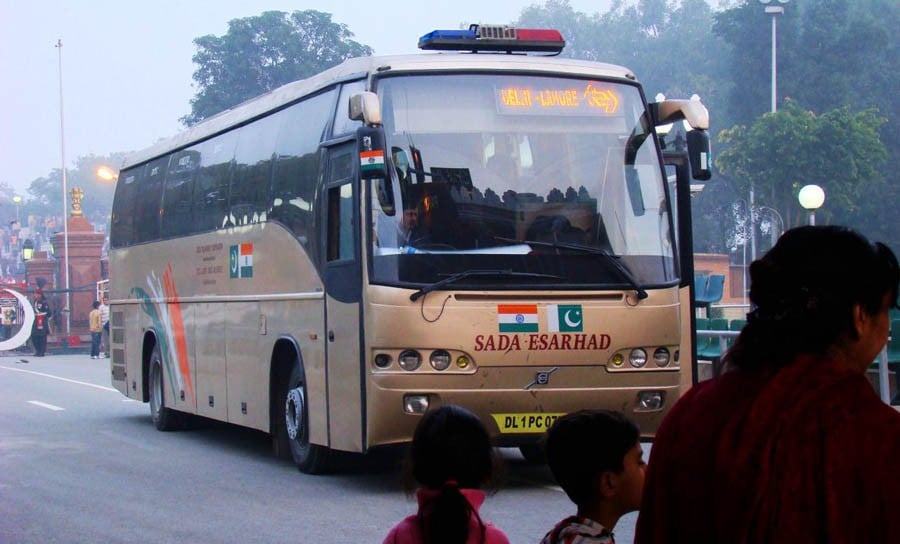
Restricted visa regime is hampering people to people interaction and consequently a healthy exchange of culture, art, business and healthcare facilities

The Lahore-Delhi Dosti (friendship) Bus Service continues to run between Wagah and Atari. But the 40-seater is often almost empty.
The only reason for the absence of passengers is non-issuance of visas by both India and Pakistan. "We have been sending and receiving five to six passengers on average every day for the past few months," says an official of the bus service. "If people get visas, we believe these buses will be full every day. Both sides will have to be generous in issuing visas to people on both sides."
Pakistanis and Indians have deep cultural, religious and social links despite the partition in 1947. A large number of people on both sides want to cross the border for many reasons, including business, education, healthcare and divided families.
However, for the past several months, relations are tense between the two countries. New Delhi has slowed down the issuance of visas to Pakistani applicants and, in a classic tit for tat manner, Pakistan is also discouraging visa applicants from the Indian side.
"The Indian High Commission is not entertaining even a single visa application these days. The situation is worsening by the day," says Madeeha Gauhar, who heads Ajoka Theatre and has taken it across the border several times.
"We held a festival in India in March and after that not a single visa has been issued to our team. It is one of the slowest visa regimes that I have ever seen," she says.
India denied visas to around 20 Pakistani artists, poets and writers set to perform in South Asian Sufi Festival that ended in Jaipur last week. The external affairs ministry had turned down the visa request.
Earlier, in February, a Pakistani delegation was denied permission for the South Asian Literature Festival. Same happened a year earlier in 2016. Recently, Indian External Affairs Minister, Sushma Swaraj, granted a visa to a seven-year-old Pakistani child who requires an open heart surgery after the mother approached the minister on Twitter.
Read also: Editorial
"Last year, we wanted to have a peace conference in India, taking nearly 200 Pakistanis but the Indian High Commission denied visa and the conference was postponed later," says Kamran Islam, coordinator of Pakistan chapter of Pak-India Peoples’ Forum for Democracy. "The links between different professional and social groups have almost ended."
One is quite sure that an equal number of visas sought by Indians have been refused by Pakistan.
This May peace-mongers on both sides called both arch rivals to resolve differences through dialogue. An online petition, starting with 250 prominent people and now endorsed by nearly 5,000 leaders, politicians, retired soldiers, journalists, lawyers, historians, activists, filmmakers, physicians and students, has urged both sides to be positive and begin a dialogue for peace.
"In the last 70 years since Partition, the people of India and Pakistan have seen too many conflicts and loss of valuable lives. They have seen enough of distrust and tensions. Those who suffer are ordinary people who are denied visas and those in the conflict zones, especially women and children as well as fishermen who get routinely rounded up and arrested for violating the maritime boundary," the petition says.
The petition, in particular, resolves to "support and encourage all forms of people to people contact, and remove visa restrictions and discrimination faced by citizens of both countries. This must be further taken forward to allow visa-free travel between India and Pakistan."
"It is important that people in India and Pakistan are able to visit each other and a visa regime that allows people to people contact is very essential if there is to be any improvement in the relationship," says Siddharth Varadarajan, Founding Editor The Wire, India.
"I think apart from family reasons or religious pilgrimages that Indians want to make in Pakistan or Pakistanis want to make in India, there should be promotion of normal tourism. Why can’t ordinary Indians visit all the beautiful places in Pakistan and why can’t people from Pakistan come as tourists and visit different places in India that may not necessarily have any religious significance for them," he says.
Gauhar thinks the Modi regime in India is to be blamed for this situation. "Many marriage ceremonies are being delayed in Pakistan because it is difficult to have relatives and friends from India at the moment. We, the people on both sides, are at the mercy of visa policy of both countries which is almost suspended due to tension. But we feel they should sympathetically think about this policy because it is people to people contact that will eventually bring sanity in relations between the two countries." She urges the governments to facilitate travelling between the two countries and ease up the visa regime.
"I think it is absolutely essential that the governments of India and Pakistan build a rational relationship so that visas to tourists and for all kinds of people to people contact can be made easier. Unless this happens, I don’t foresee any great improvement in relations," Siddharth Varadarajan concludes.